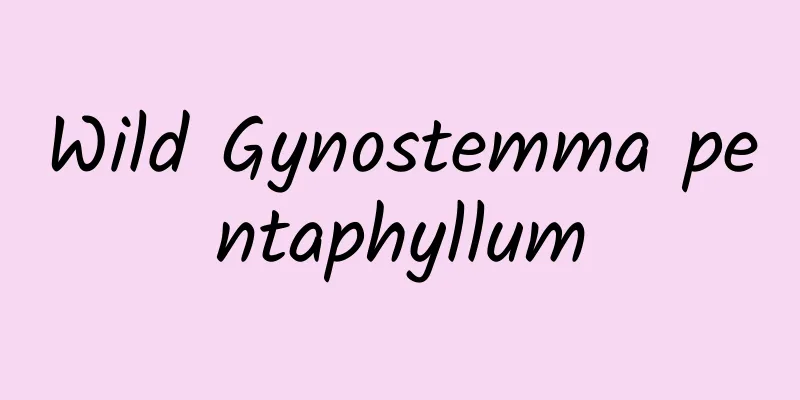Wild Gynostemma pentaphyllum

|
Do you know what Gynostemma pentaphyllum is? It is also called grass of paradise and five-leaf ginseng. It is already a very precious Chinese medicinal material and a common health product. It can be seen how powerful its medicinal effect is. In the south, Gynostemma pentaphyllum is also called ginseng. Generally, wild Gynostemma pentaphyllum is more common. Let’s take a look at some of the effects of wild Gynostemma pentaphyllum. Gynostemma pentaphyllum is a very precious medicinal herb with great value. It has been recognized in traditional Chinese medicine. Its most important value is its medicinal value. It can effectively treat the three highs, namely high blood pressure, high blood sugar and high blood lipids. The most common one is wild Gynostemma pentaphyllum. Main Value Medicinal value Jiaogulan is the most important, with the following Chinese medicinal properties: Boiling Gynostemma pentaphyllum and Ganoderma lucidum in water or making tea with them can treat high blood pressure, high blood lipids, high blood sugar, fatty liver and other diseases. It has the effects of protecting the liver and detoxifying, lowering blood pressure, and lowering blood lipids and blood sugar. The main active ingredients of Gynostemma pentaphyllum are gypenosides, gypenosides (polysaccharides), water-soluble amino acids, flavonoids, multiple vitamins, trace elements, minerals, etc. Medicinal material source: the whole herb of Gynostemma pentaphyllum, a plant of the Cucurbitaceae family. Nature and flavor: bitter; slightly sweet; cool in nature. Meridians entered: Lung, spleen, and kidney meridians. Efficacy: tonifies Qi and strengthens the spleen, resolves phlegm and relieves cough, clears away heat and detoxifies. Efficacy classification: tonic medicine; expectorant medicine; heat-clearing medicine. Indications: physical weakness; consumptive spermatorrhea; leukocytopenia; hyperlipidemia; viral hepatitis; chronic gastroenteritis; chronic tracheitis. Dosage and Administration: For internal use: decoct in water, 15-30g, grind into powder, 3-6g; or make into tea. For external use: take appropriate amount, mash and apply on the affected area. Harvesting and storage: It can be harvested 3-4 times in summer and autumn every year, washed and dried. Contraindications: A small number of patients experience nausea and vomiting, abdominal distension, diarrhea (or constipation), dizziness, blurred vision, tinnitus, etc. after taking the medicine. If the above symptoms occur, you can stop taking the medicine and rest. Economic Value Tea made from Gynostemma pentaphyllum has great benefits for the human body. Gynostemma pentaphyllum tea is extracted from the tender buds and dragon whiskers in the axils of Gynostemma pentaphyllum leaves. The tea soup is clear and can be brewed continuously for 4-6 cups without losing its color. It has health care functions brought by the nutrients contained in the growth point and can be drunk for a long time without any toxic side effects. Effects and functions: Lowers blood lipids, regulates blood pressure, prevents and treats thrombosis, prevents and treats cardiovascular diseases, regulates blood sugar, promotes sleep, slows down aging, prevents and fights cancer, improves immunity, and regulates human physiological functions. Gynostemma pentaphyllum can protect the adrenal glands, thymus and endocrine organs from atrophy with age, maintain the function of the endocrine system, and has the effects of lowering blood sugar and improving sugar metabolism. Everyone should learn more about the high value of wild Gynostemma pentaphyllum. This kind of medicinal material has made great contributions to traditional Chinese medicine. It can treat and prevent many diseases, such as hyperglycemia. Hyperglycemia is already the most common phenomenon. More and more people are suffering from diabetes. People with diabetes may wish to try traditional Chinese medicine treatment. |
<<: How to eat fresh Dendrobium candidum
>>: The efficacy and function of Ma Ren Wan
Recommend
The efficacy and function of lily seeds
Lily seed is a medicinal material frequently used...
Why do doctors in operating rooms wear green coats instead of white coats?
Yesterday, when I was surfing the Internet out of...
The efficacy and function of Zanthoxylum bungeanum
Chinese medicinal materials are very effective in...
Why are pig ears and chicken cartilage so delicious?! Really delicious warning
Let’s do a little survey first to see how many pe...
The efficacy and function of Xia Wan
For Chinese medicinal materials such as Xia Wan, ...
With the emergence of “evil nickel”, will the price of electric vehicles be able to remain unsustainable?
The price of nickel has been rising like crazy re...
Hot topic! Is the crunchy Gongcai in hot pot actually dried lettuce?
Recently, the topic #Gongcai is dried lettuce# ha...
Alibaba: More than 60% of Taobao mobile app users are under 30 years old
199IT original compilation According to Alibaba&#...
A 6.8-magnitude earthquake struck Luding, Sichuan! Save! An effective guide to escaping and self-rescue in the event of an earthquake
According to the official measurement of China Ea...
The efficacy and function of raw strychnine
To put it simply, raw strychnine is the seed of s...
The efficacy and function of bitter melon root
Bitter melon root is a very common Chinese medici...
With an annual output value of nearly 2 billion, the "French foie gras" you eat may be produced in this small county in China
Goose liver, as an offal food, is not unfamiliar ...
MH370 found? Mystification or technological breakthrough?
More than seven years later, news about Malaysia ...
Do you recommend that you sleep less? Do you recommend that you don't sleep less?
Yesterday, Zhang Chaoyang's suggestion that e...









